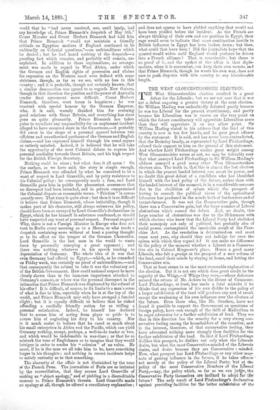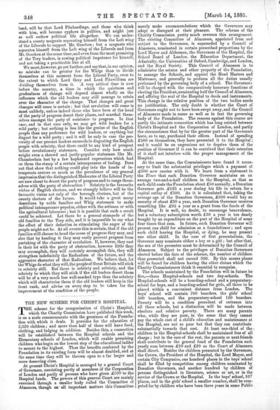THE WEST GLOUCESTERSHIRE ELECTION. T HE West Gloucestershire election resulted in
a great defeat for the Liberals ; but wo are not sure that it was not a defeat auguring a greater victory at the next election. '
Sir William Marling was undoubtedly defeated partly because he was too Liberal for the present constituency, and partly because his Liberalism was in excess on the very point on which the future constituency will appreCiate Liberalism more than they will appreciate it on any other point. Sir William Marling stated in his address that the land of this country is now in too few hands, and he gave great offence by the statement. It is said, and has never been contradicted, that the Berkeley family, as represented by Lord Fitzhardinge, refused their support to him on the ground of this statement. And whether Lord Fitzhardinge carries great weight among West Gloucestershire voters or not, we may be tolerably sure that what annoyed Lord Fitzhardinge in Sir William Marling's address annoyed a good many other West Gloucestershire electors also. The truth is, that this is almost the last election in which the present landed interest can assert its power, and no doubt this great defeat of a candidate who has identified himself with the land policy of the future, rather than with the landed interest of the moment, is in a considerable measure due to the ebullition of spleen which the prospect of having to consult the political views of the agricultural labourers has produced in the minds both of landowners and' of tenant-farmers. It was not the Conservative gain, though there was a Conservative gain, but the large number of Liberal abstentions which caused the defeat. And, no doubt, this large number of abstentions was due to the ill-humour with which electors who knew that the Liberal Party had abolished their monopoly not only of political, but probably also of social power, contemplated the inevitable result of the Fran chise Act. As the revolution is determined-on and must come next year, why should they not indulge for once the spleen with which they regard it? It can make no difference to the policy of the moment whether a Liberal or a Conservative sits in Colonel Kingscote's place. Hence a good many Liberals, who felt a grudge at the prospect of a new reform of the land, eased their minds by staying at home, and letting the Conservative win.
That at least seems to us the most reasonable explanation of the election. But it is not one which does great credit to the sagacity of the Whigs,—if Whigs they were,—whose defection secured the return of Mr. Ackers to the House of Commons. Lord Fitzhardinge, at least, has made a fatal mistake if be thinks that any expression of his own dislike to the policy of a larger subdivision of the land will produce any sort of result except the weakening of his own influence over the electors of the future. Even those who, like Mr. Goschen, have not found it possible to support the Government on questionsof foreign policy, have seen enough of the drift of Radicalism to be eager advocates for a further subdivision of land. They see that in this direction lies the security for a very strong conservative feeling among the householders of the counties; and in the interest, therefore, of that conservative feeling, they have advocated nothing more strongly than facilities for the further subdivision of the land. So that if Lord Fitzhardinge dislikes this prospect, he dislikes not only what the Liberals desire, but what the most Conservative-minded of the Liberals desire, and desire because they are Conservative . minded'. Now, what prospect has Lord Fitzhardinge or any 'other meg. nate of gaining influence in the future, if he takes °Same = not merely at the policy of the Liberal Party, but at tte policy of the most Conservative Members of the Liberal Party,—nay, the policy which, so far as we can jed)fe-, the Conservative Party themselves are inclined to adopt or' Mg future I The only result of Lord Fitzhardinge'!; decraration against providing facilities for the better subdivision of the
land, will be that Lord Fitzbardinge, and those who think with him, will become cyphers in politics, and might just as well eschew political life altogether. We can under stand a county magnate separating himself from the Left wing of the Liberals to support Mr. Goschen ; but a magnate who separates himself from the Left wing of the Liberals and from Mr. Gosoben at the same time, and even from the most promising of the Tory leaders, is sowing political impotence for himself, and not taking a practicable line at all. We must,however, go yet further, and say that, in our opinion, no mistake can be greater for the Whigs than to divide themselves at this moment from the Liberal Party, even to the extent to which Lord Grey and Lord Fitzwilliam are dividing themselves from it. A very critical time is now before the country, a time in which the quietness and gradualness of change will depend almost wholly on the influence which the old leaders may still manage to retain over the character of the change. That changes and great changes will come is certain ; but that revolution will come is moat unlikely, unless indeed those who have been at the head of the party of progress desert their places, and marshal them selves amongst the party of resistance to progress. In that case, and in that case only, we may get wild leaders for a wild party ; but nothing is less like the genius of the English people than any preference for wild leaders, or anything but disgust for a wild party ; and it will be only in case the per versity of our present leaders succeeds in disgusting the English people with sobriety, that there could be any kind of prospect before revolutionary statesmen. Consider only how much weight even a shrewd and justly-popular statesman like Mr. Chamberlain lost by a few haphazard expressions which had on them the stamp of a certain intemperance of feeling. Does not that show that nothing could play into the hands of in temperate orators so much as the prevalence of any general impression that the distinguished Moderates of the Liberal Party are now about to desert the party of progress and to range them selves with the party of obstruction ? Sobriety is the favourite virtue of English electors, and we strongly believe will be the favourite virtue not only of the borough electors, but of the county electors of the future. It would take a great many desertions by noble families and Whig statesmen to make political intemperance popular, either with the artisans or with the agricultural labourers ; but it is possible that such a result could be achieved. Let there be a general stampede of the old families to the Tory side, and it is impossible to say what the effect of their defection in stimulating the anger of the people might not be. At all events this is certain, that if the old families still choose to head the cause of progress they may, and
also that by heading it they may easily prevent progress from partaking of the character of revolution. If, however; they cast
in their lot with the party of obstruction, however little they may accomplish, they will certainly accomplish this, they will strengthen indefinitely the Radicalism of the future, and the aggressive character of that Radicalism. We believe that, let the Whigs do what they will, the people of Great Britain will stick to sobriety still. But there is sobriety and sobriety, and the sobriety to which they will stick if the old leaders desert them will be of a very much less well-marked type than the sobriety which will characterise them if the old leaders still keep in the front rank, and advise on every step to be taken for the improvement of the condition of the people.



































 Previous page
Previous page